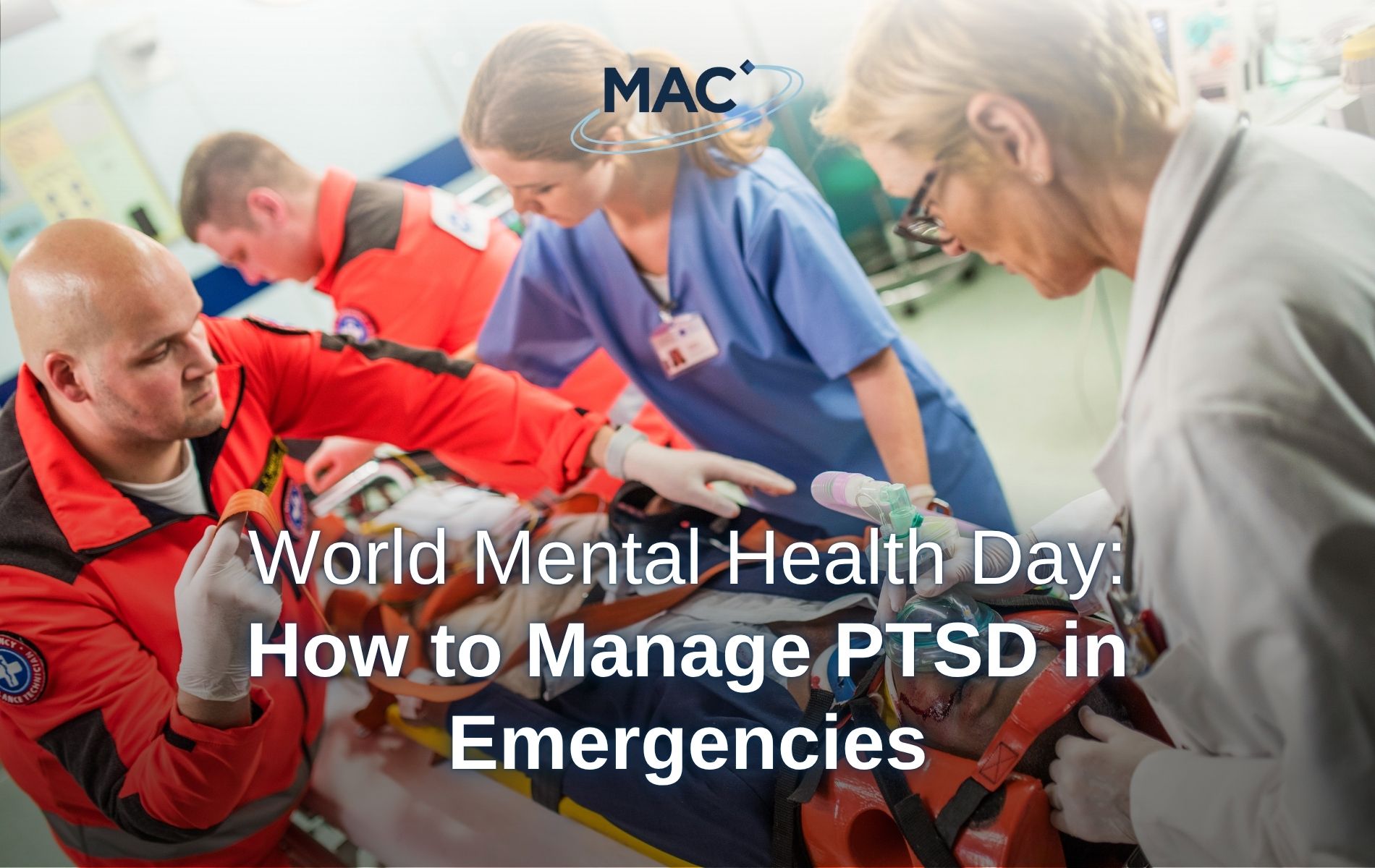World Mental Health Day celebrates the importance of prioritising mental health, and this year, the focus is on protecting your mental health in catastrophes and emergencies. Many conditions, like depression, anxiety, and post-traumatic stress disorder (PTSD), can be exacerbated in these situations due to the additional stress they create. Here at MAC, we’re recognising the day by exploring methods to manage PTSD symptoms in emergencies.
PTSD in emergencies
PTSD is an often-overlooked consequence of living through or witnessing traumatic events such as violence or serious accidents. Some of the most well-known symptoms include flashbacks, sleep disturbances, hypervigilance, and avoidance1.
Flashbacks are often triggered by reminders of the traumatic event. These can be external – such as sights, sounds, smells, or locations associated with the trauma – or internal – such as thoughts, feelings, or sensations similar to those experienced during the trauma. Triggers are specific to each person and can vary for an individual at different times2.
For those living with PTSD, emergency situations can affect symptoms3. Emergencies often lead to a heightened concern for personal safety, disruption of routine, and can re-traumatise individuals who have already experienced or witnessed a traumatic event. This can trigger PTSD episodes or intensify symptoms due to the increase in trauma reminders and heightened anxiety3.
Tips for managing PTSD
Developing effective coping strategies for your PTSD can help you manage symptoms in day-to-day life. What works will vary person to person and finding techniques that suit you can take time. Establishing an approach that works for you can support you in situations where you may be confronted with your triggers as you go about your day. These techniques can also be beneficial should you find yourself in an emergency when practised regularly in everyday life.
Some methods for managing your PTSD symptoms in daily life include:
1. Grounding techniques
Grounding can help you focus on the present and pull you out of a flashback or intrusive memory. It could be a mantra you repeat to yourself or focusing on your environment and using your senses to describe it2.
2. Deep breathing exercises
Deep breathing when you start to experience a flashback can help lessen its intensity. Taking slow, deep breaths when your emotions are heightened can calm the body and mind and allow you to regain control2.
3. Self-care planning
There are times where your ‘window of tolerance’ (when your emotions are balanced and controlled and you are at your most effective5) may be narrowed. You can prepare for how to calm yourself by building a self-care plan that includes relaxing activities, for example, exercise and meditation. This may improve your well-being and ward off flashbacks and other symptoms.
4. Reaching out for support
Speak to those around you, such as friends and family, if you find that your symptoms are becoming overwhelming. You should also contact a mental health professional for additional support. This may help you cope with the difficult feelings that you may experience during emergencies2.
5. Movement
Moving around can help to disrupt the body’s stress response. Walking, running, jumping, or other physical activities can help to centre you in the moment and take your focus away from your trauma4.
These methods can be helpful in the moment, but more long-term management of PTSD symptoms may require treatment.
This usually begins with talking therapies such as cognitive behavioural therapy (CBT), peer support groups, and eye movement desensitisation and reprocessing (EMDR). You may also be prescribed antidepressant medication alongside or as an alternative to psychological treatment.
However, unfortunately research shows that up to 60% of people do not receive adequate benefit from current PTSD treatments6, making the development of effective novel treatments vital.
MAC Clinical Research is looking for people living with PTSD to participate in future research opportunities. Whatever your background, you can help to make medical developments that could improve the quality of life for millions of people.
To learn more about our current trials or to register your interest in future studies, please visit our current trials webpage.
References
1 National Emergencies Trust – Not all wounds are visible: PTSD and the impact of disasters
2 PTSD UK – Understanding PTSD Flashbacks and Triggers
3 US National Center for PTSD – Effects of Disaster Events on PTSD
4 Amen Clinics – Coping with a PTSD Episode: Effective Strategies and Support Options
5 PTSD UK – The Window of Tolerance and PTSD
6 Riaz et al. (2023) – MDMA-Based Psychotherapy in Treatment-Resistant Post-Traumatic Stress Disorder (PTSD): A Brief Narrative Overview of Current Evidence




